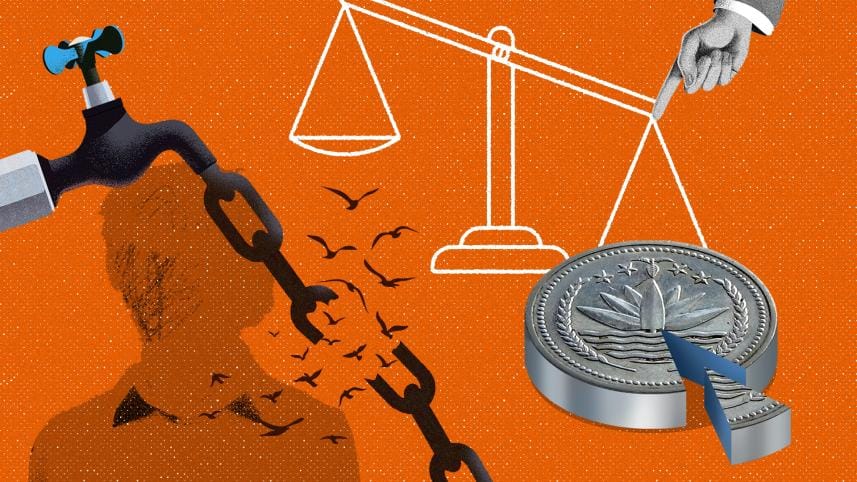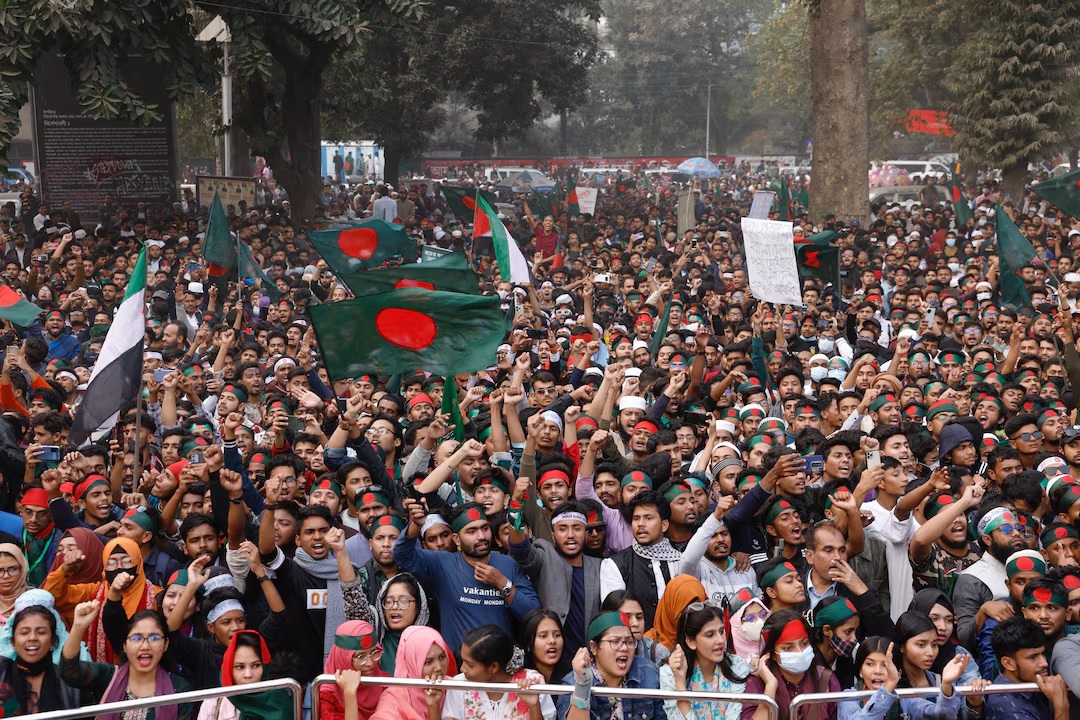Systemic failures, rising inequality, and the path to recovery

Until the fall of Sheikh Hasina's government in 2024, Bangladesh's economy was heavily shaped by rampant corruption, plundering, and illicit asset transfers orchestrated by a select few powerful groups. These practices caused long-term harm to the nation, putting immense pressure on foreign currency reserves, which continued to decline steadily. The economy was further strained by extravagant, debt-financed projects that burdened the nation with high repayment obligations. Inflation reached unprecedented levels, affecting daily life. Despite reports of steady GDP growth, employment challenges remained unresolved, exacerbating social unrest. The rising prices of essential commodities, including gas and electricity, compounded the economic strain on ordinary citizens, intensifying inequality and centralising wealth among a privileged few.
The centralisation of wealth and deepening of social inequality created a precarious economic situation. Without a change in governance, these crises would have worsened. After the Sheikh Hasina administration fell, corruption and asset misappropriation linked to specific banks and development projects came to a halt. A sprawling network of extortion that had permeated various sectors was also dismantled. This shift provided an opportunity for much-needed reforms. The interim government has begun addressing these challenges by forming commissions to investigate systemic failures and propose solutions. It has pledged to base its reforms on findings from these commissions. A white paper committee has already submitted a detailed report highlighting the mismanagement, corruption, and plundering that characterised the previous tenure.
During the previous administration, institutions were rendered ineffective, functioning as tools to implement directives from the top. Institutional processes were sidelined, creating inefficiencies and widespread public mistrust. Restoring these institutions to serve public interests and realigning them with their intended roles has become one of the most critical responsibilities of the current administration. For example, the Bangladesh Bank's integrity and functionality were undermined during the last regime as its policies were tailored to serve the interests of select groups. Financial irregularities, such as the plundering of funds under the guise of loans, reached an alarming scale. Groups like Beximco, S Alam, Bashundhara, Summit, Orion, and a few more received disproportionate financial benefits, creating instability across the entire financial sector.
Immediate actions such as restructuring politically manipulated banks, shutting down institutions established for vested interests, and implementing measures to curb inflation must take precedence. Addressing irregularities within the financial sector is critical to reducing economic haemorrhage and restoring public confidence. Stabilising the financial system and normalising the dollar exchange rate would create a healthier economic environment. Reports such as those by Farashuddin on the Bangladesh Bank and Ibrahim Khalid on the share market provided actionable recommendations, yet no significant progress has been made to act on these insights. This government must prioritise these reforms, ideally by early 2025, to demonstrate its commitment to addressing the financial sector's deep-rooted problems.
In the power and energy sectors, the government has suspended the indemnity law that protected harmful projects from scrutiny. However, it has also announced that many controversial projects and agreements initiated under this law will remain. This decision is deeply concerning, as several of these projects are detrimental to national interests. The Rampal coal-fired power plant, which threatens the ecological balance of the Sundarbans, and the Rooppur nuclear power plant by Russia, managed by Indian entities, require immediate reassessment. Both projects have been criticised for their financial inefficiencies and environmental risks, raising questions about their long-term viability. Ample research, documentation, and evidence regarding the irregularities and harmful impacts of these projects already exist. There is no need to delay action further. While cancelling projects like Rampal and Rooppur might result in some financial losses, the cost of continuing them would be significantly higher, both economically and environmentally. Lives, livelihoods, and critical natural resources, such as the Sundarbans, are at stake. The government must prioritise the well-being of its people and take decisive steps to mitigate these risks by terminating or renegotiating such harmful projects.
During the last administration, aside from oligarchs, significant benefits were granted to civil-military bureaucrats and the police to maintain political control. Meanwhile, crucial public sectors like education and healthcare were neglected. This neglect led to systemic inefficiencies, chaotic management, and severe resource shortages. Students and labourers, two of the most vulnerable groups in society, faced acute financial deprivation, limiting their opportunities and quality of life. To address this, the government must allocate more resources to education and healthcare and align funding levels with the UN-recommended proportion of GDP. The interim government could begin that by increasing budget allocations and ensuring their effective utilisation.
It is important to announce a national minimum wage policy by early 2025. Such a policy should ensure that no worker's income falls below the poverty line. Instead, the minimum wage should be adjusted to reflect a liveable income, allowing workers to meet their basic needs and contribute meaningfully to the economy.
While extortion networks have been curbed in most sectors, there are signs of their resurgence. The supply chain for essential goods remains dominated by an oligopoly or a handful of influential corporate groups. Their influence distorts market dynamics and restricts fair access to goods for citizens. The previous government not only failed to dismantle this oligopoly but actively supported it. The current administration must address this issue by breaking the control of these groups and ensuring competitive practices in the marketplace. Introducing a universal rationing system could be a vital step towards achieving this goal.
Rationing systems, currently limited to select groups such as the military and police, could be expanded to include all citizens. By ensuring equitable access to essential goods, such a system would reduce the influence of monopoly groups and stabilise market prices. Many countries have successfully implemented similar systems. The government can draw from these examples and reorganise the public goods distribution framework to create a fairer and more inclusive system.
Institutional decay was a hallmark of the Hasina administration, affecting sectors from education and healthcare to banking, infrastructure and even the judiciary. Restoring institutional integrity requires urgent attention. However, the resurgence of coercive practices within institutions, mob violence, power grabs, and forced resignations threatens a fair working environment. These practices must be stopped to rebuild trust and allow competent individuals to perform their roles effectively. Without functional institutions, efforts to restore economic and social stability will remain futile.
Bangladesh's economic policies have long been shaped by institutions like the World Bank, International Monetary Fund (IMF), and Asian Development Bank (ADB). The World Bank and ADB, with their various projects in sectors such as water, energy, railways, education, healthcare, jute, forestry, and infrastructure, and the IMF with its loan flow, actually determine policy frameworks to support global, regional, and local big businesses at the cost of public interest and the environment. Detailed investigations into projects and programmes supported by these institutions are essential to determine the scale of public suffering, deprivation, and national loss, including the environmental disasters caused by them. Mechanisms must be introduced to hold these institutions accountable. Without addressing this systemic issue, meaningful economic change will remain elusive.
Anu Muhammad is former professor of economics from Jahangirnagar University.
Views expressed in this article are the author's own.
Follow The Daily Star Opinion on Facebook for the latest opinions, commentaries and analyses by experts and professionals. To contribute your article or letter to The Daily Star Opinion, see our guidelines for submission.




 For all latest news, follow The Daily Star's Google News channel.
For all latest news, follow The Daily Star's Google News channel. 

Comments